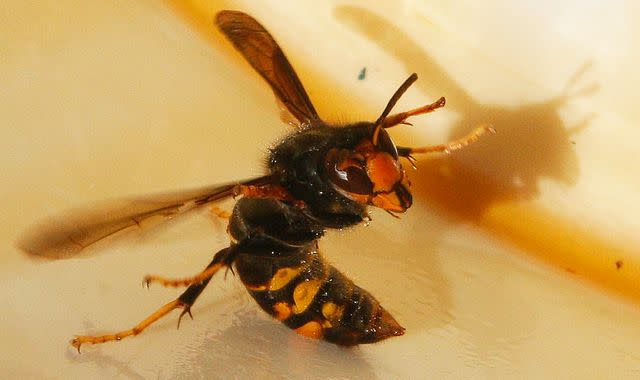Record number of Asian hornet sightings in UK - as report highlights huge worldwide cost of invasive species

A record number of Asian hornet sightings have been reported in the UK so far this year, figures show.
There have been 22 confirmed sightings of the non-native species so far in 2023, according to the Department for Environment, Food and Rural Affairs (DEFRA).
That is more than the previous six years combined - and more than ten times the number sighted last year.
While Asian hornets are considered no greater risk to human health than other wasps or hornets, they are predators of native bees and wasps.
It comes as a landmark report by the United Nations (UN) warns that invasive species are costing the world economy at least $423bn (£336bn) a year.
The report also warns that invasive species are travelling around the world at "unprecedented rates" because of humans, and are threatening native plants and animals with extinction.
'The tip of the iceberg'
Published by the UN's Intergovernmental Platform on Biodiversity and Ecosystem Services (IPBES), the report has found that more than 37,000 "alien species" have been introduced by many human activities to regions and biomes around the world.
Of those, more than 3,500 are reported to have had negative impacts on their non-native environments - and are therefore classed as "invasive alien species".
The report, published on Monday, also warns that new alien species are being recorded at an unprecedented rate of approximately 200 each year.
Meanwhile, the global economic cost of invasive alien species has at least quadrupled every decade since 1970, according to the authors of the report, who have described the figure as "a huge underestimate" and "the tip of an iceberg".
One major concern highlighted in the report, compiled from research by 86 scientists from 49 countries, is the impact on native species.
Click to subscribe to ClimateCast with Tom Heap wherever you get your podcasts
It warns that invasive alien species have contributed solely or alongside other drivers to 60% of recorded global extinctions - and are the only driver in 16% of the documented global animal and plant extinctions.
Governments around the world have committed to protecting 30% of the Earth's land and seas for nature by 2030, and 143 of them have approved the new IPBES report as providing some of the scientific knowledge towards achieving this goal.
Professor Helen Roy, of the UK Centre for Ecology and Hydrology and one of the report's co-chairs, said invasive species can be mitigated "through effective management".
Read more:
Warmer summers could increase risk of mosquitoes carrying 'fatal diseases' in UK
Turtle washed up on beach over 4,000 miles to its home
"But if they do reach new areas, then being prepared and having early detection and rapid response is absolutely critical.
"Of course, extinction is such an important thing to be considering, but also it's really important to think about the extinction of interactions, when one species is displacing another or reducing its numbers to such very low abundance.
"We are causing ecological changes that perhaps will lead to really quite unpredictable outcomes in terms of the functioning of these ecosystems and the benefits we receive from them."
Reporting sightings
The water hyacinth, an aquatic plant native to South America but now found on all continents in the world aside from Antarctica, was found to be one of the most widespread invasive alien species worldwide.
Other particularly successful invasive species include the black rat and the harlequin ladybird.
In the UK, the North American grey squirrel has pushed the native red squirrel to the fringes of the British Isles, outcompeting it for food while carrying a disease lethal to the red squirrel but which does not affect the grey squirrel.
Other invasive species that have prompted concern include the Himalayan-native rhododendron - a plant popular with gardeners but which can harbour fungus deadly to other plants - and giant hogweed, which can cause nasty blisters on the skin of humans unfortunate enough to brush past it.
Scientists have also warned that climate change may make more favourable conditions for invasive species, such as the Asian hornet, in the future.
The GB Non-Native Species Secretariat urges anyone who suspects they have seen an Asian hornet or a nest in the UK to report it with a photograph and location - either via the Asian Hornet Watch app or by email.
They urge particular vigilance around southern areas of England and Wales, as well as around major ports.
The hornets, first spotted in the UK in 2016, are considerably larger than native wasps and have a distinctive black upper abdomen.


